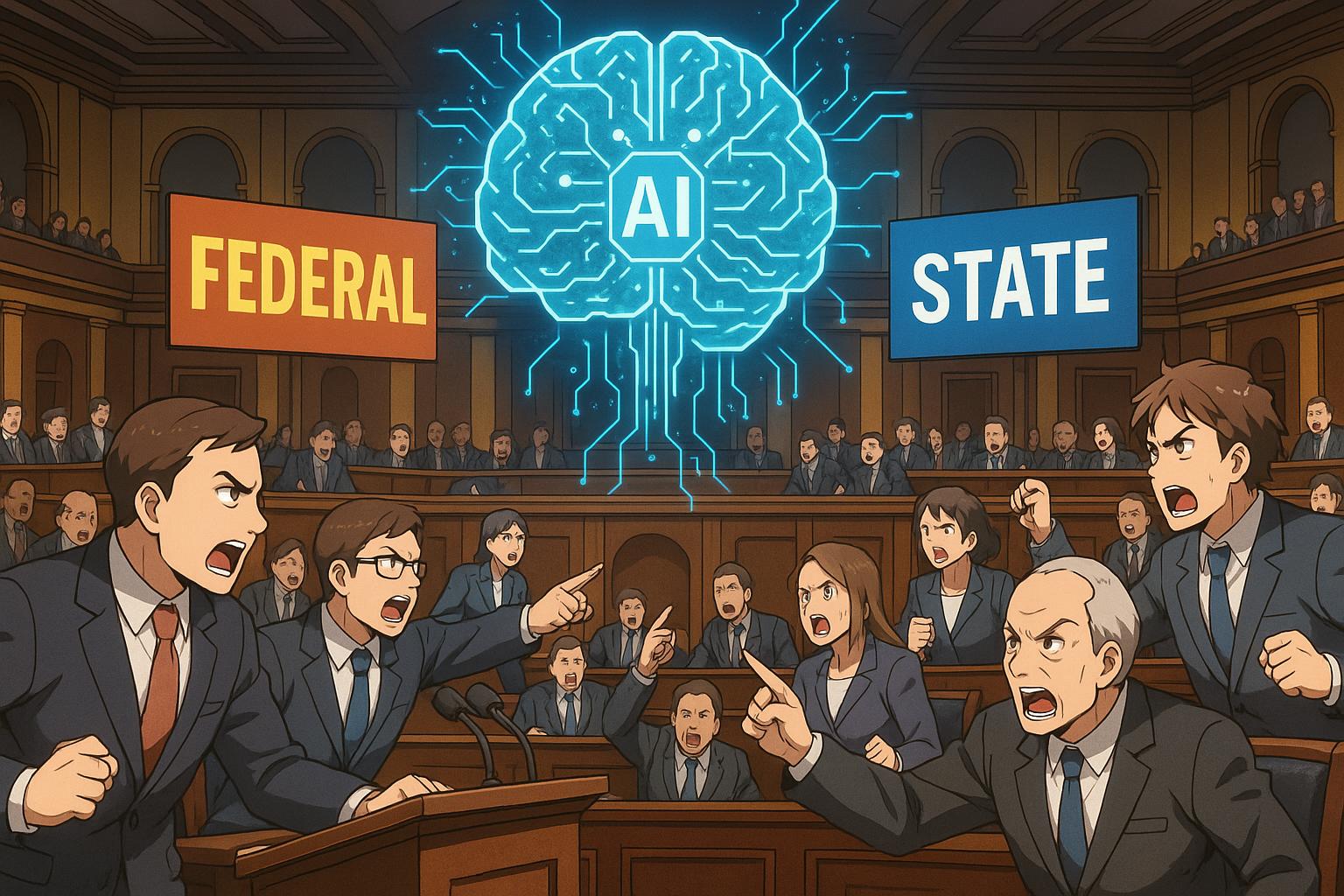A controversial federal proposal linking AI funding to a decade-long ban on state regulations ignites fierce debate, dividing lawmakers, activists, and states over local control versus national oversight of artificial intelligence.
Amid mounting tensions over artificial intelligence regulation, a new federal proposal could significantly alter the landscape for state and local governance. President Donald Trump’s “One Big Beautiful Bill,” which links comprehensive federal funding initiatives to a potential decade-long moratorium on state-level AI regulations, is stirring controversy nationwide. Proponents argue that halting state regulation would prevent a confusing patchwork of laws and ensure nationwide cohesion in technological oversight. However, opponents warn that such a freeze would undermine local control and exacerbate community concerns regarding AI applications and data management.
This proposal raised notable alarm among activists and policymakers alike. Residents like Ray, who is opposing the construction of a large AI data centre near their home in Alexandria, Virginia, expressed fears that the bill could nullify local efforts to manage AI’s impact. Ray articulated a widespread concern, stating, “It potentially could undo not only my efforts… but anyone across the country who is working to try to regulate and rein in data centers.” Similarly, Representative Thomas Massie—a Republican from Kentucky who opposed the bill—charged that the moratorium would facilitate large corporations acquiring zoning variances, allowing AI data centres to be built closer to residential areas. Others, such as Representative Marjorie Taylor Greene, admitted to not fully understanding the implications of this provision before voting in favour, later expressing her opposition on social media.
In response to the backlash against the sweeping moratorium, Senate Republicans on the Commerce Committee have proposed an alternative. Instead of a blanket ban, this version links federal broadband funding to the extent of a state’s AI regulation. States wishing to access these federal funds would be required to delay any proposed regulations on AI, prompting criticism that this approach merely shifts the regulatory debate rather than resolving it. Watchdog groups have blasted both proposals, arguing that they essentially represent a “gift” to big tech companies, enabling them to operate without sufficient oversight as concerns about AI safety and ethical use grow. Lawrence Norden of the Brennan Center noted, “What we are seeing now is an attempted gift to big tech companies that would certainly profit from a complete lack of oversight.”
The ongoing conflict surrounding AI regulation highlights a broader struggle between federal and state governance. Over 550 AI-related bills were introduced across 45 states in 2024 alone, with many aimed at addressing pressing issues such as discrimination, deepfakes, and consumer protection. Notably, California has made strides in this area with recent legislation targeting misleading chatbot marketing and establishing a regulatory framework for AI. Senator Scott Wiener from California emphasised the need for proactive regulation, reflecting the state’s historical commitment to leading tech policy reform in alignment with emerging technologies.
Amid this landscape of competing interests, experts have emerged on both sides of the debate. Dario Amodei, the CEO of AI company Anthropic, argued in a New York Times op-ed against the proposal’s sweeping nature, describing it as “too blunt” for an evolving field. He urged for a federal transparency standard for AI developers, underscoring the need for accountability and safety before AI models are deployed to the public. Conversely, some policy experts have suggested that the alleged patchwork of state laws could hinder innovation and diminish national competitiveness, a perspective echoed by the American Enterprise Institute’s Will Rinehart.
As California’s legislative efforts continue to progress, the fate of the federal AI moratorium remains uncertain, particularly with the contrasting approaches taken by the Senate and House. As the two chambers navigate their differences, the outcome will carry profound implications for the future trajectory of AI governance in the United States. With increasing scrutiny from both the public and the political arena, the call for comprehensive and coherent AI oversight grows louder, signalling an imperative for stakeholders to engage in meaningful dialogue about the responsible deployment of this transformative technology.
 Reference Map:
Reference Map:
- Paragraph 1 – [1], [4]
- Paragraph 2 – [1], [2], [5]
- Paragraph 3 – [3], [4]
- Paragraph 4 – [2], [3], [6]
- Paragraph 5 – [5], [6]
Source: Noah Wire Services
- https://www.kcra.com/article/new-federal-ai-proposal-could-upend-state-and-local-regulations/64994458 – Please view link – unable to able to access data
- https://www.reuters.com/business/retail-consumer/anthropic-ceo-says-proposed-10-year-ban-state-ai-regulation-too-blunt-nyt-op-ed-2025-06-05/ – In a New York Times op-ed, Anthropic CEO Dario Amodei criticised a Republican-backed proposal to impose a 10-year ban on state-level artificial intelligence regulation, describing it as ‘too blunt’ for the rapidly evolving AI landscape. The moratorium, part of President Donald Trump’s tax cut bill, seeks to override recent AI regulations implemented by various states. Amodei argued that such a ban would hinder both state action and the development of a cohesive national policy. Instead, he advocated for a federal transparency standard requiring AI developers to disclose testing methods and risk mitigation strategies, especially regarding national security. He emphasised the importance of holding AI companies accountable for ensuring model safety before public deployment. Amodei noted that Anthropic, along with competitors OpenAI and Google DeepMind, already follow such disclosure practices. However, he stressed that legislative measures may be needed to maintain transparency as AI models grow more powerful and corporate motivations evolve.
- https://www.axios.com/local/san-francisco/2025/06/03/california-ai-regulation-senate-chatbots-rights – Two AI regulation bills in California, authored by Senator Steve Padilla, have passed the state Senate, potentially setting the stage for a legislative conflict with federal efforts to block state-level AI regulation. SB 243 targets the misleading marketing of chatbots as solutions for loneliness and mental health concerns, while SB 420 proposes establishing a regulatory framework for AI systems. These initiatives come amid broader state efforts across the U.S. to safeguard AI development and usage, even as Congress considers a nationwide moratorium on AI regulation through a reconciliation bill. The proposed federal action could obstruct California’s attempts to implement AI oversight. Senator Scott Wiener emphasised the need for proactive regulation given the fast-evolving nature of AI technology. California’s leadership in tech policy, historically ahead of federal legislation, continues with these AI measures, reflecting the state’s commitment to establishing accountability and safety in the deployment of artificial intelligence systems. Both bills will next proceed to the state Assembly and possibly the governor’s desk for final approval.
- https://www.ft.com/content/aed82f47-b441-4bb3-930e-eca10585fc6d – As the U.S. grapples with the challenge of regulating artificial intelligence (AI), political leaders and tech executives face growing tensions between deregulation at the federal level and increasing legislative activity among states. Following President Trump’s revocation of broad federal AI regulations and a push for AI investment, Senate sentiment favours minimal oversight to maintain a competitive edge over China. Tech CEOs, like OpenAI’s Sam Altman, warn against adopting Europe’s stringent AI laws. Yet, state-level initiatives—over 550 AI-related bills were introduced in 45 states in 2024 alone—seek to address issues such as deepfakes, discrimination, and consumer protections. Critics warn that this patchwork of state laws could hinder innovation and create compliance confusion. A proposed federal moratorium on new state AI laws has sparked backlash, highlighting the broader struggle between national and local governance. Experts suggest states are stepping in where federal leadership is absent, addressing AI’s most harmful applications. Despite initial resistance, bipartisan cooperation on AI-related legislation, such as criminalising AI-generated sexual abuse material, signals that national regulation may become inevitable. Policymakers remain divided, but with increasing public and political scrutiny, comprehensive AI oversight in the U.S. seems likely on the horizon.
- https://time.com/6328332/federal-ai-regulation-schumer-forum/ – U.S. senators and technology experts met for the second AI Insight Forum, hosted by Senate Majority Leader Chuck Schumer, to discuss AI-driven innovation and safety. The previous forum revealed unanimous agreement on the need for legislation, and this forum saw unanimous support for significant federal funding to support AI innovation. Discussions included contributions from diverse figures including venture capitalists, academics, and civil rights campaigners. While some participants pushed for immediate legislative action, concerns about the rapid pursuit of superintelligent AI were voiced but not widely acknowledged. Proposed legislative measures span various categories, such as broad regulatory frameworks, specific use-case regulations, innovation support, and workforce initiatives. Some proposals aim to curb online harms, enhance public safety, and boost AI research resources. There’s bipartisan agreement on outcompeting China and workforce training initiatives. Schumer aims to consolidate these initiatives into a comprehensive legislative package similar to the CHIPS and Science Act. However, experts predict incremental changes given the early, poorly understood implications of AI and the looming 2024 presidential election, which might complicate ambitious legislative efforts. Non-legislative actions, including federal investigations and an expected AI executive order, are also underway.
- https://www.kiplinger.com/politics/how-will-state-laws-hurt-future-of-ai – The rapid advancement of artificial intelligence (AI) faces several potential hurdles, including electricity shortages, chip supply issues, and now, a significant challenge from state-level regulations. In 2025, hundreds of AI-related bills have been introduced across U.S. states, aiming to establish rules for transparency, discrimination prevention, and the use of high-risk AI systems. Colorado has already passed a comprehensive AI law, prompting concerns about fragmented and inconsistent regulations. In response, a draft Republican tax and spending bill proposes a 10-year moratorium on state AI regulations, allowing only laws that promote AI adoption. While the proposal is unlikely to pass soon, it has sparked a critical national debate. Proponents argue that patchwork laws could stifle innovation and increase business costs. Notably, even Colorado’s Governor now supports a federal pause. However, critics caution that without federal rules in place, a moratorium could create an unregulated landscape. The issue echoes past challenges with internet and privacy regulations, highlighting the urgent need for federal action. The outcome will significantly impact AI’s development trajectory and regulatory environment for years to come.













